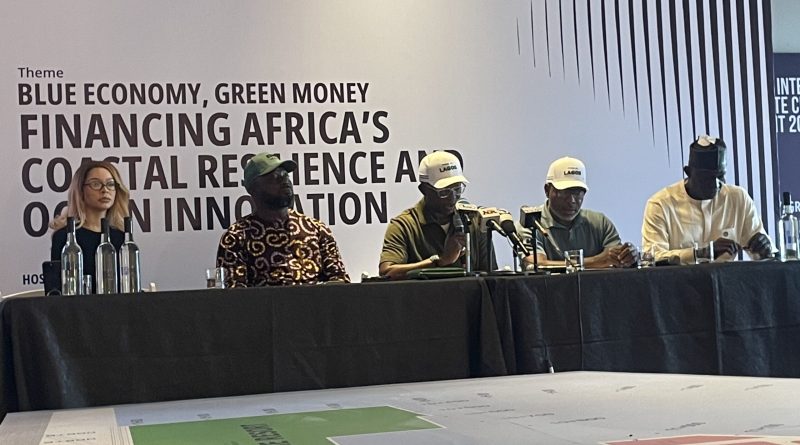Lagos, Eko Atlantic City partner to harness waterways, address coastal climate challenges
The Lagos State Government has partnered with Eko Atlantic City to transform the state’s coastal challenges into economic growth and sustainability drivers, as part of its ongoing efforts to diversify Lagos’ blue economy.
Speaking at a pre-summit press conference for the Lagos International Climate Change Summit 2025 on Thursday, the government said the initiative aims to turn the state’s coastal vulnerabilities into opportunities for innovation and development.
Summit 2025
The Commissioner for the Environment and Water Resources, Tokunbo Wahab, noted that the 2025 summit, which will be held from November 6–7 and is themed “Blue Economy, Green Money: Financing Africa’s Coastal Resilience and Ocean Innovation,” will focus on strategies to strengthen Lagos’ response to climate and coastal challenges.
Highlighting the coastal challenges facing Lagos State, Mr Wahab said, “Lagos is one of the world’s most vibrant coastal megacities, a hub of creativity, commerce, and culture.
“Yet, it is also one of the most climate-vulnerable. Rising sea levels, coastal erosion, and flooding are not distant possibilities but daily realities.
“In Lagos, we believe vulnerability can be transformed into vision and challenge into opportunity. This is why this year’s summit speaks directly to our mission to convert Lagos’ coastal challenges into economic and ecological strength,” the commissioner said.
Mr Wahab stated that the summit will serve as a platform for subnational governments, global development institutions, investors, scientists, and innovators to collaborate on designing real, bankable climate solutions.
“The 2025 edition will host more than 1,200 delegates from over 30 countries, including international agency heads, global CEOs, financiers, youth innovators, and researchers, all united by one mission: to finance the future of resilience in Africa.
“It is particularly significant that this summit will take place just ahead of COP30, allowing Lagos to shape the global conversation, translating local action into international impact.
“This year’s summit will spotlight the Blue Economy, harnessing oceans and waterways for sustainable growth; Green Finance, mobilising capital for renewable energy, waste recycling, and nature-based infrastructure; Innovation and Youth, empowering the next generation of African climate entrepreneurs; and Partnerships, strengthening cross-sector collaboration for long-term transformation,” he said.
Mr Wahab further added that the state government’s goal is to position Lagos as the climate capital of Africa.
“We are investing in coastal defences, urban greening, flood mitigation, renewable energy, and circular economy models that can serve as templates for other cities across the continent,” the commissioner concluded.

Partners
Representing Eko Atlantic City, the Head of Corporate Communications, Joanna Fabikun, highlighted Lagos’s coastal challenges, particularly the erosion risks that make areas such as Victoria Island vulnerable to climate-related disasters.
“Over a hundred years ago, during the colonial era in Nigeria, the East and West Walls were created along the Commodore Channel.
These walls were created to allow larger vessels to enter Nigeria. As many of you may know, all ships entering Nigeria pass through the Commodore Channel to Apapa.
“A hundred years ago, larger vessels couldn’t come in, so they created these walls. These walls disrupted the natural flow, which started the erosion. Not only did we lose the entire beach, but the Atlantic Ocean was knocking on the doors of Ahmadu Bello Way, which is the road that we are sitting on now,” Ms Fabikun said.
She noted the collaborative efforts between Eko Atlantic City and the Lagos State Government in constructing the Great Wall of Lagos, a massive sea defence system designed to control ocean surges and prevent further erosion of land previously lost to the Atlantic Ocean.
“Not only did this make the road immutable, but the Victoria Island stretch of Ahmadu Bello Way is now one of the highest points on the island. So once the Atlantic Ocean breaches that road, there will be a downward spiral for the rest of Victoria Island and parts of Lekki.
“How did we tackle this challenge? Again, we created the Great Wall of Lagos, which was manufactured on-site, to ensure sustainability. If any of these concrete blocks are displaced, we can replace them almost instantly, and we use GPS precision when placing these blocks.
“We also bring in rocks from Igbokoda as part of the material, which is another sustainable choice. This wall has been tested against future storms, including those projected over the next 1,000 years. We are also creating a pedestrian-friendly city here and investing heavily in planting 200,000 and 300,000 trees,” she said.

Deputy Director, Deep Blue Project, Mr. Tuti Easton Hebron.
Blue economy
Representing Dayo Oberiola, the director-general of the Nigerian Maritime Administration and Safety Agency (NIMASA), the Deputy Director of the Deep Blue Project, Tuti Easton, emphasised that the newly established Federal Ministry of Marine and Blue Economy is focused on harnessing the nation’s vast ocean resources and transforming them into a thriving, sustainable economic sector.
READ ALSO: Lagos govt to decommission major landfills in push for cleaner, flood-free city
He noted that the initiative aligns with Lagos State’s broader vision of leveraging its coastal potential for development.
The aim and objective of it is to take advantage of resources in the oceans and transform them into an economy that will flourish. We’re actually looking at the possibility of harnessing all the mineral resources. While doing that, we preserve the ecosystem and create wealth for the nation,” Mr Easton said
The International Finance Corporation (IFC), the African Development Bank (AfDB), and the United Nations Development Programme (UNDP) are international partners collaborating with the Lagos State Government on the project.
The Special Adviser to the Governor on Environment, Rotimi-Akodu Olalekan Olamidosu, and the Permanent Secretary, Office of Drainage Services and Water Resources, Mahamood Adegbite, were also present at the pre-summit press conference.

